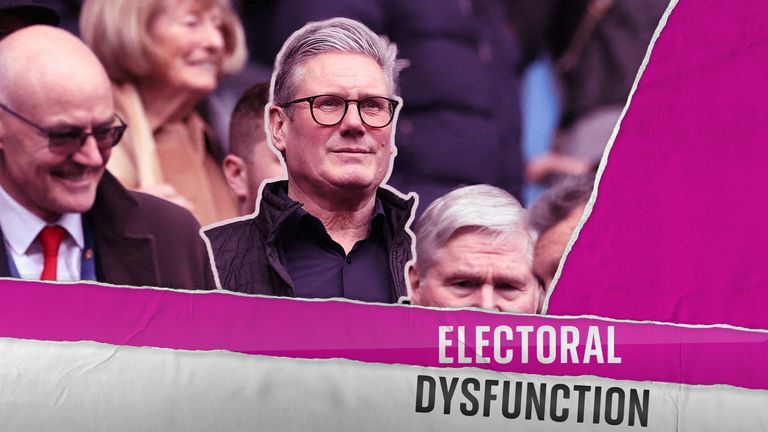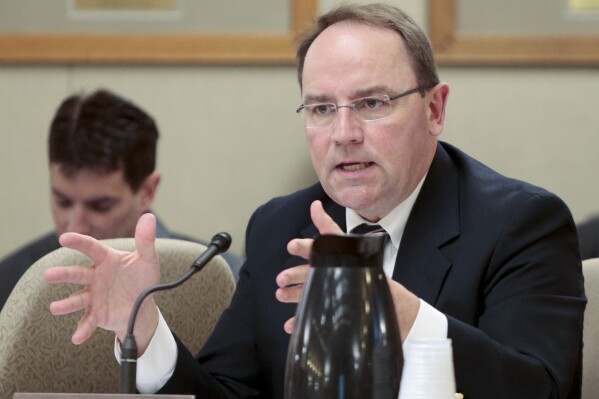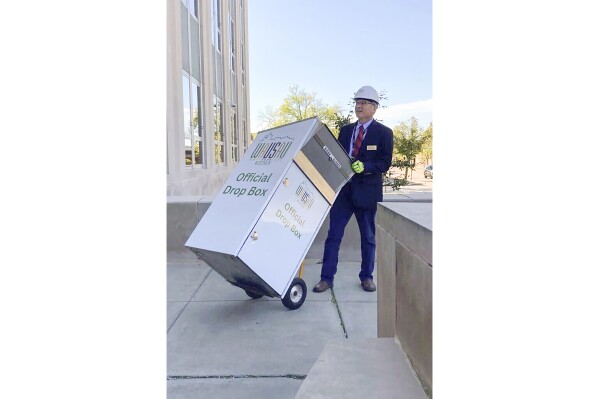New York City Mayor Eric Adams was indicted Thursday after on federal charges that he allegedly took bribes and illegal campaign contributions from foreign sources.
The charges marked a stunning fall for Adams, a former police captain who made a commitment to law-and-order a cornerstone of his political platform even as multiple federal investigations tightened around him and members of his inner circle.
Adams has consistently said he is cooperating with the investigations and has denied wrongdoing through the steady drumbeat of searches, seizures and departures of top members of his administration.
But as news of the indictment spread Wednesday night, he began to mount a defiant defense that he was being targeted by the federal government for his political views, adopting language similar to former President Donald Trump and other politicians accused of crimes.
“I always knew that If I stood my ground for New Yorkers that I would be a target — and a target I became,” Adams said in a videotaped speech released Wednesday night, adding that the case is “based on lies.”
From working-class childhood to police captain
Adams has often highlighted his working-class upbringing. He was one of six children raised by a single mother and has spoken of carrying around a garbage bag packed with his clothes because he feared his family would be evicted.
At 15, he was beaten by police officers after being arrested for trespassing, but the bruising encounter sparked a desire to change the system from within, he said. Adams joined the New York City transit police in 1984 and eventually became a New York Police Department officer when the transit department merged into the larger NYPD.
He rose to the rank of captain and was the co-founder of an advocacy group called 100 Blacks in Law Enforcement Who Care, which sought criminal justice reform and denounced police brutality.
He retired from the police department in 2006.
Making the transition into politics
Adams, a Democrat, then went on to win a seat in the state Senate representing a district in Brooklyn. From there, he was elected Brooklyn borough president in 2013 and held that post while launching a campaign for the mayor’s office.
His run for mayor was marked with embarrassing headlines over whether he actually lived in New York City. It was reported that Adams would often sleep in his Brooklyn Borough Hall office because he co-owned an apartment in New Jersey. To quell speculation over his residence, Adams offered reporters a tour of a basement apartment in the Bedford-Stuyvesant neighborhood in Brooklyn that he said was his primary residence.
His moderate mayoral campaign centered on his rise from a tough upbringing, through the police department and into politics. Though he would sometimes speak critically about the police department he once served in and talk about his experience with police brutality, Adams rejected progressive calls to “defund the police” and stressed that he was proud of his time in law enforcement.
Adams was elected as mayor in 2021, becoming the second Black mayor of New York City after David Dinkins. Adams succeeded former Mayor Bill de Blasio.
Facing challenges as mayor
He took office as the city was still reeling from the COVID-19 pandemic, with its tourism industry, economy and school system facing major challenges as well as an overwhelming sense that crime in the city was at a high.
Through it all, Adams maintained a commitment to law enforcement and carried himself with a self-described “swag” that featured flashy suits, earrings and walkout music for his news conferences.
For a time, some political watchers saw Adams as the kind of moderate Democrat who could be a model for a party struggling to balance the divides between its progressive and centrist wings. But as the years went on, Adams’ popularity took a sharp decline, even as the city bounced back from pandemic job losses and crime.
He began to attract ridicule for his plan to crack down on rats — an eternal problem in New York City — while racking up health violations for rat infestations at his Brooklyn row house.
His administration became bogged down with attempts to house tens of thousands of international migrants who overwhelmed the city’s homeless shelters, with Adams at odds with President Joe Biden over funding and a strategy to handle the influx of new residents. He began to impose limits on shelter stays for the migrants and mounted a case against a unique rule that requires the city to house homeless people.
About a year ago, the federal investigations into the Adams administration first emerged, when FBI agents raided the home of his chief fundraiser. Days later, agents seized the mayor’s phones and iPad as he was leaving an event in Manhattan.
Earlier this month, federal investigators seized electronic devices from the city’s police commissioner, schools chancellor, deputy mayor of public safety, first deputy mayor and other trusted confidantes of Adams both in and out of City Hall. A wave of high-profile departures followed.
On Thursday, Adams was indicted on charges that he took illegal campaign contributions and bribes from foreign nationals in exchange for favors that included helping Turkish officials get fire safety approvals for a new diplomatic building in the city.
Disclaimer: The copyright of this article belongs to the original author. Reposting this article is solely for the purpose of information dissemination and does not constitute any investment advice. If there is any infringement, please contact us immediately. We will make corrections or deletions as necessary. Thank you.



